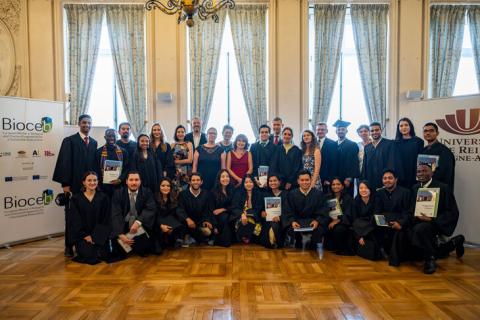
Applications are Open for the Bioceb Master’s Degree
November 17 2023Bioceb (the European Master in Biological and Chemical Engineering for a Sustainable Bioeconomy) is a two-year joint master’s program that trains future professionals to meet the challenges associated with the expansion of the global bioeconomy without losing sight of the crucial issues of sustainability and circularity. Applications are open for the Bioceb Master’s Degree until January 29, 2024.
AgroParisTech has always shown strong support for Erasmus Mundus Joint Master’s Degrees and over the years, as it has pursued its internationalization strategy and built its educational offering, has taken part in a growing number of joint master’s degree programs, even acting as the coordinating entity for two of them—including Bioceb! Bioceb was launched in 2019 and welcomed its first class of students in 2020.
What is the Bioceb master’s degree?
Bioceb is coordinated by AgroParisTech and Paris-Saclay University (Coordinator: Dr. Stéphanie Baumberger; Project Manager: Jeanne Beyrand), alongside four other universities that are fully involved in jointly developing the program: Aalto University (Aalto) – Finland; Tallinn University of Technology (TalTech) – Estonia; University of Liège (ULiège) – Belgium; and University of Reims Champagne-Ardenne (URCA) – France.
5
majors
89
students since 2019
44
nationalities
21
associated partners
Bioceb trains future professionals to meet the challenges associated with the expansion of the global bioeconomy without losing sight of the crucial issues of sustainability and circularity—all while taking into account the rapidly expanding biobased products industry’s need for scientists with knowledge of the associated markets and socioeconomic context.
Bioceb is rooted in an interdisciplinary approach, offering in-depth training on biotechnology that spans the wide variety of biological resources that exist and their optimal use, the design and scaling of bioprocesses, engineering for biobased products in target markets, and complementary skills such as socioeconomic and environmental evaluation and project management. The educational approach utilized also includes confronting students with case studies and allowing them to discover biorefinery systems that are tailored to local conditions.
It is built in a modular way to encourage cultural exchange and dialogue among students from different geographical and educational backgrounds. It is designed to be a collaborative experience that enables students to offer each other assistance, learn from one another, and create the kind of lasting ties that will shape their future careers. Students can also participate in a host of jointly organized events, including URCA’s start-of-term week, the summer school in Tallinn, and the official graduation ceremony.
Majors and curriculum overview
Students can choose between 5 majors, each involving three universities in at least two countries.
Major 1 – Bioproducts, Green Chemistry, and Biomass Engineering (URCA/TalTech/AgroParisTech)
Major 2 – Bioproducts, Green Chemistry, and Bioprocesses (URCA/TalTech/ULiège)
Major 3 – Bioproducts, Green Chemistry, Materials, and Polymers (URCA/TalTech/Aalto)
Major 4 – Agricultural Resources, Value Chain Analysis, and Bioprocesses (URCA/AgroParisTech/ULiège)
Major 5 – Agricultural Resources, Value Chain Analysis, Materials, and Polymers (URCA/AgroParisTech/Aalto)
In addition to their specific curriculum for each semester, all students complete a shared module called the “Green Line Project” (GLP), which brings students together in groups to complete a multi-site project over the first three semesters of the master’s program. Work on these Green Line Projects can be showcased in academic conferences or scientific competitions such as the Bio-based Student Innovation Challenge, organized by the Bio-based Industries Consortium (BIC). This year, Bioceb students won first prize in the European final!
What career perspectives are available to Bioceb graduates?
Bioceb graduates acquire experience and international contacts that open up a host of career opportunities across the globe in research, higher education, and the private sector.
Some possibilities after this master’s degree include:
– Ph.D. studies;
– Researcher in chemical and biological engineering;
– Engineer in the field of bioprocesses, biomaterials, or biocatalysis;
– Research and innovation project manager;
– Bioindustry business developer;
– Startup manager.
Three quarters of the first graduating class found work within 6 months of graduation. Over half of those are pursuing a doctorate.

